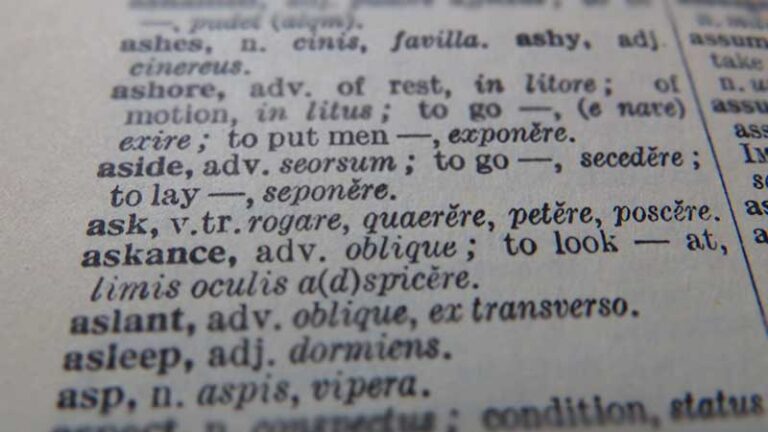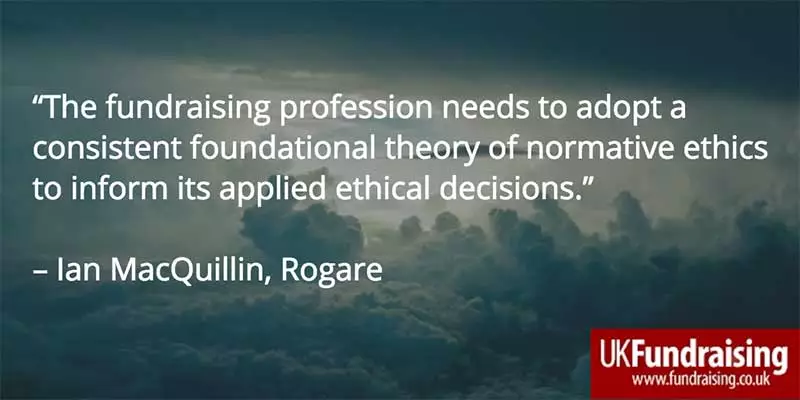Think tank to develop fundraising ethics theory to support the profession

Rogare, the fundraising think tank at Plymouth University, is to develop a new theory of fundraising ethics to underpin further the profession.
In particular it will develop, following research within and beyond the fundraising sector, a theory of ‘normative‘ fundraising ethics, as opposed to the ‘applied’ ethics guidelines which exist for example in the form of the Institute of Fundraising’s Code of Fundraising Practice and the Fundraising Standards Board’s Fundraising Promise.
The latter tell fundraisers, and indeed the public, what fundraisers may or may not do. A normative ethics approach would explain why fundraisers do what they do.
Advertisement
Normative ethics are, according to Wikipedia, “the branch of philosophical ethics that investigates the set of questions that arise when considering how one ought to act, morally speaking”.
Similarly, much of fundraising’s professional ethics focuses on fundraisers’ responsibilities to their donors, but largely ignores what duties fundraisers have to their beneficiaries.
Criticism of some charities and fundraising techniques
Rogare is bringing forward this project following the series of criticisms and allegations by some newspapers, and the complaints from nearly 400 people following coverage of the death of volunteer poppy seller Olive Cooke.
Ian MacQuillin, Rogare‘s Director, and a blogger on UK Fundraising, said that this new theory of ethics would help the fundraising profession avoid “making up its ethics on the hoof” in response to such public and media criticism.
He hopes that, by describing some of the think tank’s early thinking and ideas, it will contribute to the discussion about how fundraising needs to reform against the backdrop of negative media coverage and some public disquiet.
What will the normative theory of fundraising ethics cover?
MacQuillin explains that the theory currently being developed is summarised as ‘ethical fundraising balances the duty of fundraisers to ask for support, with the rights of other stakeholders not to be put under ‘undue’ pressure to donate’.
The term ‘undue pressure’ is used explicitly to refer to the phrase used b the Fundraising Standards Board in its Fundraising Promise.

Why does the new fundraising ethics theory matter?
MacQuillin points out that there is a “huge demand for change in fundraising”. He said:
“People and organisations with loud voices are demanding an end to, as they see it, ‘unethical’ fundraising practices”.
He is concerned that, because changes decided on today will have a direct impact on charities’ abilities to raise the money they need to provide services for their beneficiaries for the next decade, these decisions need to be based on firm, reasoned grounds.
Consequently, he argues:
“the fundraising profession has an ethical duty to ensure that any reforms enacted in response to the objections of certain stakeholders are correctly balanced with the long-term interests of the beneficiaries of voluntary organisations”.
As he made clear in his blog post on UK Fundraising today, he is sceptical that the recommendation made by the FRSB in its interim report into the Olive Cooke case to impose a limit on the number of times a charity may contact individuals “would not strike the appropriate balance between duties to donors and beneficiaries”.

If the fundraising profession is to apply ethical decisions then MacQuillin argues it needs to adopt “a consistent foundational theory of normative ethics”.
The fundraising profession needs to adopt a consistent foundational theory of normative ethics to inform its applied ethical decisions. Otherwise it risks changing and adapting its professional ethics each time the profession’s activities are challenged.
Work on the theory
The theory project has already been underway for two months. Rogare has already published its initial thinking on the subject in a post on its Critical Fundraising blog. Work will continue on the project over the summer.
The first formulation of the theory will be outlined at the Institute of Fundraising Scotland’s conference in October, and Rogare also plans to publish a working paper outlining its current thinking in more depth shortly.



